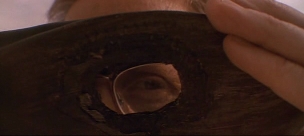 I first reviewed Falling Down on May 6th, 2000, triumphantly trumpeted as “our 150th review!” As if that were some kind of achievement. That review is still available in all its poverty and horror. It, like so many of my early reviews, deserves to be replaced, or quietly buried. (So why link to it, right? For the Internet’s sake, friend. For the Internet’s sake.)
I first reviewed Falling Down on May 6th, 2000, triumphantly trumpeted as “our 150th review!” As if that were some kind of achievement. That review is still available in all its poverty and horror. It, like so many of my early reviews, deserves to be replaced, or quietly buried. (So why link to it, right? For the Internet’s sake, friend. For the Internet’s sake.)
Falling Down is, perhaps, the only good movie Joel Schumacher ever made–the story of two men and the compromises forced upon them by life in a United States largely unaltered (certainly not for the better) by the passage of years. The social forces close to Falling Down‘s palpitating heart still exercise a steady, downward drag on this country’s isolated citizenry of lonely, atomized, all-too-fragile selves…and if that thought don’t put a damper on your day, few will.
Falling Down is nominally the story of one man’s violent rampage across Los Angeles. But this is no mere portrait of an all-American maniac. Our protagonist, Bill (Michael Douglas), is much, much more: a collision of temperament and circumstance. Falling Down is also the story of a LAPD Robbery Sergeant Prendergast’s (the Robert Duvall) last day on the job. Yet this is no police procedural. Prendergast (unlike his fellow cops) is not a telegenic, CSI-style beauty, and he is not a hard-nosed, world-weary urban warrior. Other cops in his precinct serve those roles, and half the beauty of Falling Down lies in its courageous undermining of such traditional cliches, even as it falls back on others.
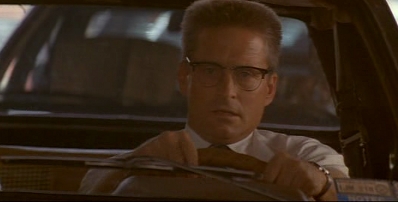 We first meet Bill in a stereotypical LA Freeway traffic jam as he goes quietly, desperately insane. Escaping his overheated car, with its broken window cranks and buzzing flies, Bill sets off on foot across the City of Angels, a lone white guy in a striped tie, carrying a briefcase. What could possibly go wrong, right? The film follows Bill’s journey across town and up the socioeconomic ladder, east to west. Roving the streets, Bill encounters various individuals who goad him into increasingly-destructive acts of violence. News of these gradually reach Prendergast as he works his way through one more day in Downtown Robbery, piecing the puzzle together and allowing the film to slowly peel back the layers of Bill, who goes unnamed for most the flick. The end credits refer to him only as “D-Fens,” after his abandoned car’s vanity license plate.
We first meet Bill in a stereotypical LA Freeway traffic jam as he goes quietly, desperately insane. Escaping his overheated car, with its broken window cranks and buzzing flies, Bill sets off on foot across the City of Angels, a lone white guy in a striped tie, carrying a briefcase. What could possibly go wrong, right? The film follows Bill’s journey across town and up the socioeconomic ladder, east to west. Roving the streets, Bill encounters various individuals who goad him into increasingly-destructive acts of violence. News of these gradually reach Prendergast as he works his way through one more day in Downtown Robbery, piecing the puzzle together and allowing the film to slowly peel back the layers of Bill, who goes unnamed for most the flick. The end credits refer to him only as “D-Fens,” after his abandoned car’s vanity license plate.
Gradually, we learn Bill’s ultimate destination: his little girl’s birthday party. Unfortunately, Bill’s ex-wife Elizabeth (Hollywood native Barbara Hershey), who has a restraining order to go alone with her full custody, is none-too-pleased with Bill’s repeated telephone calls, initially announcing his coming and (eventually) striking terror into his ex-wife’s heart.
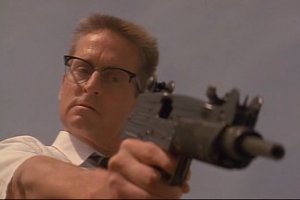
A pregnant violence runs through the proceedings, implicit in Bill’s white-collar maniac aesthetic. “Remember,” one of Prendergast’s fellow-officers remarks early on, “anything can happen today.” Stories of officers killed in the line of duty (last day or no last day) assault Prendergast throughout, while the landscape of Los Angeles itself seems to conspire to push Bill all the way over his personal edge. Posters reading “Kill” and “Gone” glare at him from walls and bus shelters. Gangsters materialize out of the smog of East Los Angeles. That same smog chokes the view Bill finds through the holes in his shoes. Weapons almost literally fall into his hands. Over the course of the film, Bill gradually sheds his civilian clothes, and thus his identity, trading his briefcase for a gym bag full of guns. His slacks and tie give way to green fatigues and boots stolen from an Army Navy store. His everyday, middle class, American values slowly drain away, along with his last few inhibitions. Similarly, we the audience experience our own paradigmatic shift as we watch Bill mutate from hero to tragic villain.
Tragic in the sense that Bill’s fatal flaw lies implicit in his character. Here is a man who bought into the American Dream – too bad he bought on credit. He had it all (as his home videos reveal): wife, kid, dog, job at a defense contractor plant. “I built missiles,” Bill informs us. “I helped to defend America.” But, outsourcing being what it is…”I’m overeducated and underskilled…or is that the other way around?” Never mind that. Evidence suggests Bill was never a Sensitive, New Age Male, even before downsizing shattered the one remaining pillar of his identity. Elizabeth left him prior to his job-loss, fearing, as she does here, for her own, and her daughter’s safety.
In under two hours Falling Down manages to indict the whole of American society. “I’m an American,” Bill tells Nick, the Nazi Army/Navy Store Owner he meets along his way, “you’re a sick asshole.” Nick the Nazi’s question is ours as well: “What kind of vigilante are you?” None at all. “I’m just a man trying to get home to his little girl’s birthday. And if everybody will just stay out of my way, nobody will get hurt.” Unfortunately for those of us trapped in our concrete hives, no one can stay out of anyone’s way, just as no one is allowed to mind his own business. Bill just has the shit luck, on what is arguably the shittiest day of his life, to cross paths with the worst of the worst. Unscrupulous Korean grocers. Cliched Latino gangsters. Indolent construction workers. Unthinking, happy-faced fast-food workers. Rich old men on golf courses. Nick the Nazi. The police. Los Angeles itself, grown out of the desert like a batch of He-La cells left to divide on a hotplate. Some commentators accused this film of racism, ignoring Bill’s upward mobility through America’s unmentionable caste system. Let that be another lesson: in a pre-9/11 world, race always trumped class in your fellow countrymen’s eyes. It still does.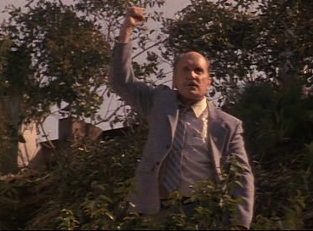
Prendergast should know, but doesn’t. This film isn’t a Marxist tract, no matter how well that could work. It is nothing more or less than the country that birthed it, quite simply American. Prendergast proves this. His office floats in sublimated cynicism and unabashed testosterone, like any other movie-precinct. It has its jokers (D.W. Moffett, channeling Bill Pullman’s performance in Predator 2) and its tokens, its hateful Captain (Raymond J. Barry, every inch the bastard brass) and its hot female detective (the wonderful Rachel Ticotin), the only one who’ll listen. We get the sense that Prendergast has good reason to leave all this behind, and his manipulative, emotionally distraught shrew of a wife only seized on those to strong-arm him into retirement. She didn’t put them there, no more than Elizabeth put the rage into her husband’s heart. We feel Prendergast has as much, if not more, reason to snap. Yet he nurtures a quality Bill lacks: simple, human empathy. This, and not the badge, (the only cops Elizabeth meets are dicks) makes Prendergast the real hero, if such a thing can exist in such a morally ambivalent universe.
Purposefully ambivalent, Falling Down plays with its audience, allowing us to revel in Bill’s adolescent acting-out while never loosing sight of how these acts appear to Bill’s victims. Over and over, character’s mistake Bill for a robber, a “vigilante,” a “nut.” As he confronts Prendergast at the end he asks, wistfully, “Am I the bad guy?” Yes, Bill, to the untrained eye (my own at age sixteen, for example). But the very fact you get to ask that question undermines the whole “good buy/bad guy” duality. In real life, we rarely know where we fall until someone else comes along to tell us. And no matter what the religious nut balls tell you, there are no paired absolutes. Real life is not mathematics. It does not balance and sometimes it stinks. “But that doesn’t give you some special right to do what you did today.”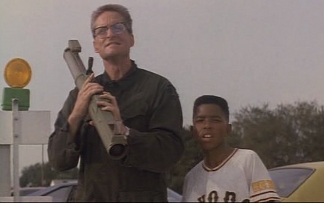
What has Bill done? In the end, not much of anything. A few shootings, one rather-lovely explosion. Some property damage, which I can always get behind. But in the end, he succeeds only in depriving his wife and child of his presence in their lives, not to mention peace of mind.
This is a story, then, of ultimate collapse, a film unafraid to call fundamentals into question. Falling Down holds up a cracked mirror and says, “Take a long, hard look, America. This is what happens when twenty years on the techno-treadmill leave you a broken, hollowed-out shell of yourself.” In that sense Falling Down is a horror story, incorrectly shelved, and perhaps one of the best horror stories of the early ’90s. Well scripted by Ebbe Roe Smith, directed with a flair and panache ol’ Joel has yet to recapture, Falling Down is a film built like the ticking bomb. Watch with caution, and be blown away.
![]()
![]()
![]()
![]()

First movie I remember seeing, I always took his wife to be the primary cause of all this – but at the time never thought why would she divorce him? Probably worth another watch to see if i can work out why!
Oh, it’s fairly easy to see, and Barbara Hershey’s performance makes it all too clear. She sells Fear like its the last day of a close-out sale, aided by an undercurrent of desperation. Her character knows that’ll be the first thought on everyone’s mind. “Look to the woman,” is just one more cliche the film brilliantly undermines. It’s worth more than another watch: this film deserves to be taught in graduate courses. I could spin an entire term of Sociology classes out of the opening montage alone. So tell your friends: it’s the most truthful portrait of American violence I’ve ever seen (to date).
For me this film fails, just barely, because there are several characters who interact with Bill, and Prendergast, who are just hostile for no reason. I have yet to meet a beggar on the street as angry as the one dipicted here and I have run into my fair share. The parts I did love was the plausiable, everyday situations that would piss anyone off like the argument with the Korean store clerk and the missing breakfeast at that McDonalds knock-off. Despite all it’s flaws, Michael Douglas and Robert Duvall do make Falling Down watchable.
Ah-ha! Now here’s something I’m actually passionate about. Yes, few bums are that enthusiastic with their pitches, and I’ve yet to meet a Korean grocer who isn’t perfectly fluent in transactional English (or Engrish). Managers are rarely if ever so readily available in big chain restaurants. Not all Army Navy surplus store owners are Nazis. You’re absolutely right: the film is full of people being dicks to our dual protagonists for no reason…save that this drives the narrative and articulates the larger point: that Prendergast and D-Fens are the same man, each choosing the opposite of the other’s path, either out of modern ennui, or into its dark heart.
But that’s just me, and I authentically love this flick.
This is the movie that gave me a soft spot for Michael Douglas. His performances in this and The Game are just incredible, with an ace twisted comedy running through them. I love it when he spouts disgruntled righteous indignation, then can’t back it up:
“You’re Korean. Do you have any idea how much money my country has given your country?”
“How much?”
“Well, I don’t know. But it must be a lot.”
My mom was a Douglas fan, starting with Romancing the Stone and continuing on through his period of intense popularity (almost everything up to A Perfect Murder…Basic Instinct excepted).
You’ve managed to sum up the appeal of Falling Down quite eloquently. Most of my fleshier friends dismissed it as “depressing” and I can see that (being a story about one man’s day-long nervous breakdown). But the drop off into “depressing” territory wouldn’t be as steep without so much dark comedy running through the piece: that vaguely uncomfortable, I-probably-shouldn’t-laugh-at-this-while-I’m-around-other-people humor. A real Gotham City breed of humor I get a kick out of, having read so many Batman comics.